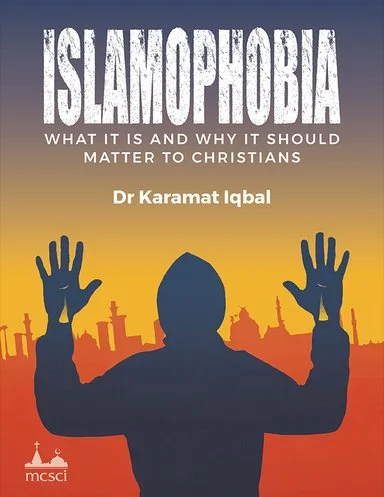Islamophobia – What it is and why it should matter to Christians
By Dr Karamat Iqbal
MCSCI. 2025. 28 pages. (Paperback and E book)
https://www.mcsci.org.uk/resources/publications-np/islamophobia/
It delights me to commend to my readers another informative, practical and pithy booklet published by the Manchester Centre for the Study of Christianity and Islam. The author, Dr Karamat Iqbal is a scholar and community activist who moved to Birmingham from Kashmir in the 1970s. A recent write-up on the Aston University website[1] is a go to source of information about him. Those of us who have attended day conferences in Birmingham over the years will recognise the context of his wise reflections. He draws from his own experiences as a Kashmiri immigrant and his ongoing work in fostering intercultural understanding in Birmingham.
The title is unambiguous regarding the purpose of the book. Islamophobia - What it is and why it should matter to Christians. In fact, Dr Karamat gives us after dinner mints; three sections signposting us to ways we can practically counter the insidious rancour of Islamophobia. I recommend that you skim the appended Contents page before reading the review.
He begins the booklet with two introductory sections, the second being a compact list of key Biblical injunctions regarding our behaviour towards others, ending with this quotation from Heather Tomlinson:
“Christians are called to love all, not just innocent Muslims . . ., even those who are radicalised and wish us harm. If we are to bear the name of Christ, we must follow his clear teaching and his cruciform example of loving our enemies.”
Dr Karamat continues with a discussion on the origins and definitions of Islamophobia making the point that ‘phobia,’ fear, migrates to meaning hostility, prejudice and hatred, ultimately, racism. He unpacks for us colour racism, cultural racism, institutional racism and structural racism concluding that, “The definition of Islamophobia used by the All-Party Parliamentary Group as ‘anti-Muslim racism’ is currently the one most widely used.” Full references are supplied in the booklet.
A time-line of the usages of the words racism and Islamophobia are fed by his own research on the ‘P word.’ The publishing of “The Satanic Verses” by Salman Rushdie in 1988 and the ensuing Muslim protests galvanized racist opinions in some sectors of British society. Finally, quoting Tariq Modood:
“What we are seeing today is anti-Muslin prejudice, anti-Muslim discrimination, and anti-Muslim racism, where Muslims are vilified, marginalised, discriminated against or where they are treated as second class citizens.”
In two-short paragraphs, Dr Karamat introduces us to the phenomenon of “The danger of the single story,” and our dependence on negative single-story, one-dimensional cultural stereotyping. I encourage you to view the TED Talk by Chimamanda Ngozi Adichie that the author quotes and supplies the references for. He writes that, ‘She shows that stereotypes are not usually totally untrue, but they are incomplete.’ We are encouraged to gather our cultural information about others from diverse sources, especially from face-to-face encounters with our Muslim friends, neighbours and colleagues.
The following three sections focus on the anti-Muslim narratives in the UK, e.g., all British Muslims support extremism, Muslim men are perpetrators of sexual violence, halal slaughter is an inhumane practice that reflects the barbarity of Islam. Then there are the inaccurate human statistics and the brutality that Muslims themselves experience on British streets, e.g., the terror attack outside the Finsbury Park Mosque. The list of illustrations are comprehensive and disturbing.
What’s this “Islamophobia has passed ‘the dinner table test’ all about?” ‘In 2011, Baroness Warsi coined this expression. She was referring to the way that some views were so commonly held that people could be put at ease by talking about them in public. She argued that expressing prejudice against Islam and Muslims had become exactly this kind of subject.’
Dr Karamat incorporates into the text statistics on Islamophobia in Europe and then a gem of a section entitled, ‘Islamophobia and Reasonable Criticism.’ This page alone justifies the book’s purchase. Cowed by the fear of not being politically correct, Dr Karamat signposts us to ways we can express unique theological truths that are obstacles to dialogue with Muslims. I was encouraged by what he writes, having earlier this year written to Angela Rayner on the subject of her department’s creation of the All-Party Committee already referred to in this review. Dr Karamat reproduces five questions that Tariq Modood suggests participants could ask themselves before speaking. There is also a reference to the Feast Youth Project founded by another Brummie, Canon Dr Andrew Smith.
The final three sections bring us back to Scripture and our Christian responses to Islamophobia. Drawing upon Lesslie Newbiggin’s writings, another one-time resident of Birmingham, Dr Karamat emphasises the role of Christianity as being countercultural. Not as we might expect, being against Islam, but challenging the Islamophobic. He gives us a couple of illustrations where Christian leaders have sought to ‘bless’ their Muslim neighbours and faced the ire and sanction of their congregations. The text ends with four searching hypothetical questions which can be used individually or in a group.
Three pages of cited sources and further reading complete the booklet.
For those already engaged with Muslims, this book’s coloured photos, glossy cover and clear typeface make it an attractive piece of literature to give away to Christian friends who want to expand their knowledge of Islamophobia.
It could be used in a House Group context or be exhibited on bookstalls in churches and at Christian events.
Aston University ends its recommendation of Dr Karamat’s contribution to community relations in Birmingham with the author’s own words:
“I’ve been learning about who I am, my place in the community and society, ever since I arrived,” Dr Iqbal shared. “I’ll continue learning until I die.”
Life-long learners are always worth listening to.
Keith Fraser-Smith
October 10, 2025
Keith dates God’s definitive call to the Muslims of the Arab world in the summer of 1970, though he had Muslim friends from 1965. Ordained in 1973, he married Janet in 1974, they served with CMS in Cairo and Amman from 1976 to 1984 when they joined Arab World Ministries. He served in leadership roles based in France, Cyprus and the UK until 2013. He and his wife continue their interests in ministry to Muslims and all things multicultural.
[1] https://www.aston.ac.uk/latest-news/dr-karamat-iqbal-ill-continue-learning-until-i-die-new-podcast


